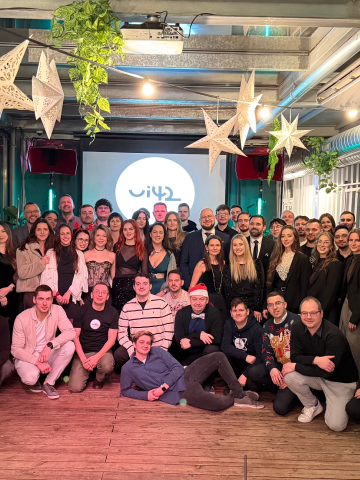AI Optimization for Web (AI SEO)
What does it mean
The digital world is constantly evolving, and with the rise of artificial intelligence (AI) and its integration into search engines and everyday applications, a new era of optimization is emerging. It's no longer just about having your website found by people and traditional search engines. The key is for your content to be understood by artificial intelligence. This is the essence of AI Optimization for the Web (AI SEO).
More info
What is AI Optimization for the Web (AI SEO)?
AI Optimization for the Web (AI SEO) or also known as GEO (Generative Engine Optimization) is a strategic approach to creating and structuring web content to ensure it is easily understandable, processable, and interpretable by artificial intelligence algorithms. While traditional SEO focuses on search engine algorithms and their ranking factors, AI SEO goes a step further – preparing your website so that AI assistants, generative models, semantic search engines, and other AI applications that consume and process information from the web can effectively utilize it.
The goal of AI SEO is for AI to not only index your content but also:
-
Extract key information and facts.
-
Understand the context and semantic relationships between entities.
-
Generate accurate and relevant answers to user questions, using your content as a source.
-
Use your content as a basis for generating new, summarized, or transformed text.
Why is AI SEO crucial in today's digital world?
With the growing dominance of AI in the online environment, the way people search for and consume information is changing.
-
AI search engines and conversational AI: Instead of a list of blue links, we increasingly receive direct answers generated by AI. If your website is not optimized for AI, it may happen that AI will not be able to effectively use it as a source, resulting in a loss of visibility.
-
AI assistants and smart devices: Voice assistants (e.g., Google Assistant, Siri, Alexa) draw information from the web. AI SEO ensures that your content is formulated so that these systems can directly respond to it.
-
Generative AI (e.g., ChatGPT, Gemini): These models learn from vast amounts of data from the internet. If your content is well-structured and semantically rich, there is a higher likelihood that AI will correctly understand and use it as a reference.
-
The future of search: It is expected that search will increasingly shift towards semantic search and direct AI-generated answers. AI SEO is a preparation for this change.
Key principles of AI Optimization for the Web (AI SEO):
To make your website "AI-friendly," focus on these aspects:
-
Structured data (Schema Markup): This is the most important pillar of AI SEO. Using Schema.org tags (JSON-LD) helps AI clearly understand the type of content (article, product, recipe, event, person), its properties, and relationships. For AI, it's like having a treasure map.
-
Example: Marking the author, publication date, ratings, product price.
-
-
Semantically rich and unambiguous content: Write clearly, concisely, and without ambiguities. Use natural language, but also ensure that key terms and concepts are consistent. Avoid slang that AI might not understand.
-
Entities and their relationships: AI learns to identify entities (people, places, organizations, products) and relationships between them. Clearly define these entities and explicitly describe their connections.
-
Example: Instead of "The company developed new software," write "The company [Company Name] developed software [Software Name], which addresses the problem [Specific Problem]."
-
-
Consistency and accuracy of information: AI notices contradictions. Ensure that the information on your website is consistent throughout the content and is truthful. This increases credibility for both AI and users.
-
Quality and authority of the source: AI models are trained on large datasets and can assess the quality and authority of the source. Create high-quality, well-researched, and expert content that is cited and linked to relevant authoritative sources.
-
Optimization for conversational AI and voice search: Formulate content to directly answer questions formulated in natural language. Create sections with FAQs (frequently asked questions) and summaries that AI can easily utilize.
-
Example: "How long does delivery take?" and a direct answer "Delivery takes 3-5 business days."
-
-
Clear content structure: Use logical headings (H1, H2, H3), bullet points, numbered lists, and clear paragraphs. Well-structured content helps AI better segment and understand information.
-
High-quality multimedia with descriptions: Images, videos, and infographics should have clear alternative texts (alt texts) and captions that help AI understand their content and context.
AI SEO vs. SEO: What is the difference (and where do they meet)?
-
SEO (Search Engine Optimization): The main goal is to improve the website's position in the search results of traditional search engines (Google, Bing) and attract organic traffic. It focuses on keywords, backlinks, technical aspects, and algorithmic ranking factors.
-
AI SEO (AI Optimization for the Web): The main goal is to make the website's content understandable for AI. It focuses on semantic structure, structured data, clarity, and consistency.
Synergy: Many AI SEO principles complement and strengthen traditional SEO. For example, well-structured data and high-quality, semantically rich content are beneficial for both AI and traditional search engines. If your website is optimized for AI, it is likely to perform better in Google's semantic search as well.
Benefits of AI SEO for Your Website:
-
Increased Visibility in AI-powered Platforms: Your content is more likely to appear as a direct answer in AI search engines or be used by AI assistants.
-
Better Interpretation of Content: AI models will be able to more accurately understand what your website is about and use it more effectively.
-
Improved Quality of Generated Answers: If generative AI models draw from your website, the resulting answers will be more accurate and relevant.
-
Preparation for the Future: By investing in AI SEO, you are proactively preparing for future changes in the online ecosystem, where AI will play a dominant role.
-
Potential for New Forms of Interaction: Your content can be the basis for innovative chatbots, interactive Q&A systems, and personalized AI experiences.
In an era where AI is transforming every aspect of digital life, AI SEO becomes a necessity. It is an investment in the future of your website and ensures its relevance and visibility in the constantly changing online environment.
Frequently Asked Questions about AI Optimization for the Web (AI SEO)
Is AI SEO the same as SEO?
No, it is not. SEO is search engine optimization aimed at improving ranking and traffic. AI SEO is optimization for AI, ensuring that your content is understandable and processable by artificial intelligence. Many principles overlap and complement each other, but their primary goals are different.
Why should I care about AI SEO if I already have good SEO?
Well-optimized SEO is a great foundation, but AI brings a new layer of content interpretation. Traditional SEO gets you into search results, but AI SEO ensures that if AI summarizes information or generates answers, it uses your content as a relevant and reliable source, gaining visibility in new forms of search and interaction.
What are the most important steps to start with AI SEO?
Start by implementing structured data (Schema Markup) on your website. Then focus on creating semantically rich, accurate, and unambiguous content that clearly defines entities and their relationships. Also, consider a FAQ section that directly answers questions.
Will AI SEO help me with voice search?
Yes, definitely. Voice search is a natural form of interaction with AI. Optimization for AI SEO includes writing content that is easily processable for voice assistants, often in the form of direct answers to questions. If AI can easily find and understand the answer on your website, there is a higher chance that your content will be used.
Do I need special tools or programming knowledge for AI SEO?
Implementing structured data often requires basic knowledge of HTML or JSON-LD, but there are also plugins and tools for CMS (e.g., WordPress) that simplify this. For semantic content optimization, it is primarily important to understand how AI "thinks" and processes information, which can be learned without programming knowledge.
Latest news
Contact us
Don't miss out on the latest news from the world of UX, programming, analytics, and marketing.











